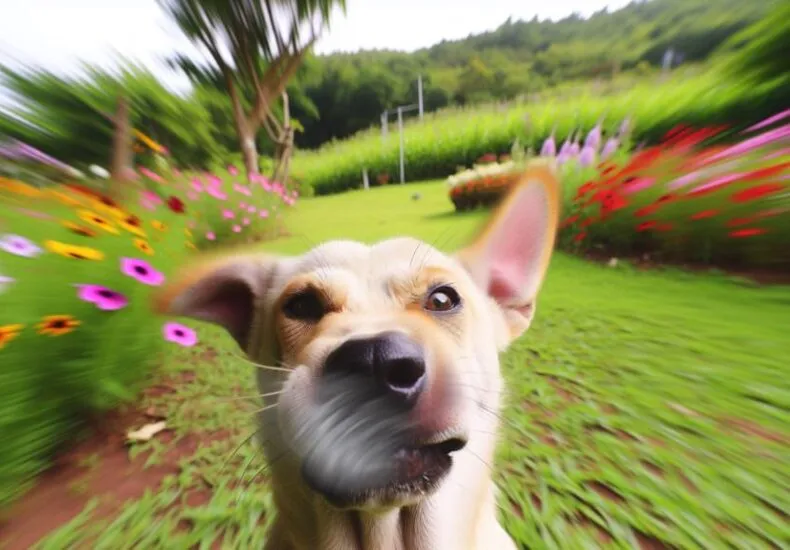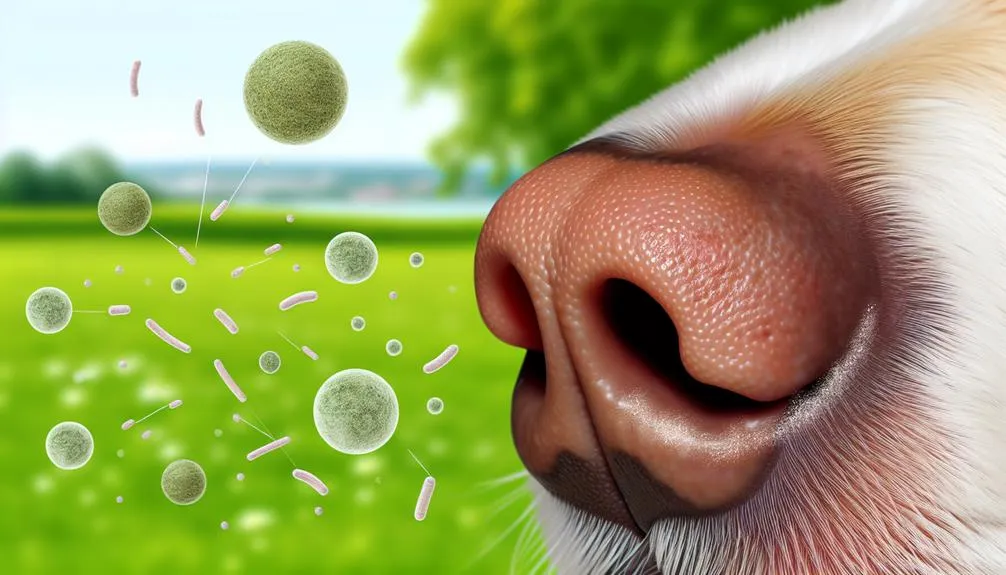
Why Is My Dog Sneezing so Much
If you've noticed your dog sneezing more than usual, it's natural to wonder what's causing it. Sneezing can stem from a variety of issues, including allergies, irritants in the environment, or even underlying health concerns. It's important to pay attention to any other signs that might accompany the sneezing, as they could provide vital clues about your dog's health. Understanding the potential reasons behind this behavior can help you determine the best course of action, but the real question is—when should you be worried enough to seek professional advice?
Common Causes of Sneezing
Sneezing in dogs can stem from several common causes, and understanding these can help you determine if it's a minor issue or something that requires veterinary attention. One frequent cause of sneezing is irritants in the environment, such as dust, smoke, or strong odors. If your dog is exposed to these irritants, you might notice an increase in sneezing frequency.
Another common reason for sneezing is infections, including bacterial or viral illnesses. If your dog shows other signs of illness, such as lethargy, coughing, or a runny nose, it's vital to consult your veterinarian, as these symptoms could indicate a more serious underlying condition that affects dog health.
Foreign objects can also lead to sneezing. Sometimes, dogs sniff around and accidentally inhale small particles or objects that can irritate their nasal passages. If you suspect this might be the case, keep an eye on your dog's behavior. If they seem distressed or the sneezing persists, it's best to seek veterinary advice.
Lastly, dental issues can contribute to sneezing, particularly if there's an infection that spreads to the nasal cavity. If your dog's sneezing frequency increases alongside oral discomfort or swollen gums, it's important to address these potential dental problems. Monitoring your dog's sneezing is necessary; a sudden change in frequency or severity can be a signal that something needs professional evaluation to guarantee your dog's health remains ideal.
Allergies and Seasonal Changes
If your dog is sneezing more than usual, it could be due to allergies triggered by environmental changes. Common allergens like pollen, dust mites, and mold can affect your pet, especially during certain seasons. Understanding these triggers can help you manage your dog's symptoms more effectively.
Common Allergens in Dogs
As the seasons change, your dog may encounter a variety of common allergens that can trigger sneezing and other allergy symptoms. These allergens can be found both indoors and outdoors, affecting your pet's quality of life. Understanding these common triggers can help you manage your dog's sneezing and discomfort.
| Allergen Type | Description |
|---|---|
| Pollen | Plants release pollen in spring and fall, leading to sneezing. |
| Dust Mites | Tiny creatures thrive in warm, humid areas, especially in bedding. |
| Mold Spores | Mold grows in damp areas, releasing spores that can aggravate allergies. |
| Grass and Weeds | Certain grasses and weeds are particularly allergenic during warm months. |
| Household Irritants | Perfumes, cleaning products, and smoke can also irritate your dog's nose. |
Monitoring your dog's exposure to these allergens can help you identify patterns and seek appropriate treatment. Regular cleaning and minimizing outdoor exposure during high pollen counts can greatly reduce allergy symptoms. If your dog continues to sneeze despite these measures, it's best to consult your veterinarian for further evaluation and solutions.
Seasonal Allergy Triggers
Many dogs experience heightened allergy symptoms during specific seasons due to various environmental triggers. One of the primary culprits is pollen exposure, which tends to peak in spring and fall. Trees, grasses, and weeds release pollen into the air, and your dog can inhale or come into contact with it while outdoors. This exposure can lead to sneezing, itching, and other allergy symptoms.
Additionally, environmental changes, such as increased humidity or temperature fluctuations, can exacerbate your dog's allergies. For instance, mold spores may become more prevalent during warm, damp weather, further irritating your pet's respiratory system. These seasonal shifts can create a perfect storm of allergens, making it challenging for your furry friend to find relief.
To help your dog cope, monitor pollen counts in your area and limit outdoor activities during high pollen days. Regular grooming can also minimize the amount of pollen and allergens your dog brings indoors. If your dog's symptoms persist or worsen, consulting your veterinarian for appropriate treatments or medications is essential. Being proactive can make a significant difference in your dog's comfort during allergy season.
Nasal Irritants and Infections

A variety of nasal irritants and infections can trigger sneezing in dogs, signaling discomfort or underlying health issues. If your dog's sneezing behaviors seem excessive, it's important to take into account potential irritants in their environment. Common culprits include dust, smoke, strong odors, and chemical fumes. These irritants can lead to inflammation in the nasal passages, causing your dog to sneeze as a way to clear their airways.
Infections, both viral and bacterial, can also contribute to sneezing. For instance, kennel cough is a highly contagious respiratory infection that can cause significant sneezing, coughing, and nasal discharge. If your dog has been exposed to other dogs in social settings, they may be at higher risk for such infections. Additionally, fungal infections, though less common, can affect a dog's respiratory health, leading to persistent sneezing.
It's vital to monitor the frequency and severity of your dog's sneezing behaviors. If accompanied by other symptoms like nasal discharge, lethargy, or difficulty breathing, it's wise to consult your veterinarian. They can determine if there's an underlying infection or if environmental factors are at fault. Identifying and addressing nasal irritants, along with proper veterinary care, can help improve your dog's overall respiratory health. By being proactive, you can guarantee your furry friend remains comfortable and free from the discomfort that sneezing can bring.
Anatomical Issues in Dogs
When your dog sneezes, anatomical issues might be at play. Conditions like nasal obstructions, allergies, and structural abnormalities can considerably affect your dog's ability to breathe comfortably. Understanding these factors can help you identify the root cause of your pet's sneezing.
Nasal Obstructions Explained
Nasal obstructions in dogs can arise from various anatomical issues, affecting their ability to breathe comfortably. One common cause is the presence of a nasal polyp, a growth that can develop within the nasal passages. These polyps may block airflow, leading to increased sneezing and discomfort. If you notice your dog sneezing frequently, it's important to observe for other signs, such as nasal discharge or difficulty breathing.
Another potential cause of Nasal obstruction is the presence of a foreign object. Dogs are naturally curious and may snuffle or sniff at things they shouldn't, leading to objects becoming lodged in their nasal passages. This can cause irritation, inflammation, and significant discomfort, prompting excessive sneezing as your dog attempts to dislodge the item.
If you suspect a Nasal obstruction due to a polyp or foreign object, it's vital to consult a veterinarian for a thorough examination. They can provide accurate diagnoses and recommend appropriate treatments, ensuring your dog can breathe easier and feel more comfortable. Timely intervention is key to preventing further complications and ensuring your dog's overall well-being.
Allergies and Sensitivities
Pets can suffer from various allergies and sensitivities that lead to sneezing and respiratory discomfort. These reactions can stem from environmental factors, such as pollen, dust mites, mold, and pet dander. If your dog is sneezing frequently, it may be reacting to allergens in its surroundings. Monitoring your home for potential triggers, like cleaning products or air fresheners, can help identify what might be causing the issue.
Food sensitivities are another common culprit. Certain ingredients in your dog's diet, like grains, beef, or dairy, can provoke Allergic reactions, leading to symptoms like sneezing, itching, or gastrointestinal upset. If you suspect food sensitivities, consider consulting your veterinarian about an elimination diet to pinpoint the problematic ingredient.
Keeping your dog's living environment clean and minimizing exposure to known allergens can greatly reduce sneezing episodes. Regular grooming and bathing can also help remove allergens from your pet's coat. If symptoms persist, it is crucial to seek veterinary advice to explore further testing and Treatment options. By understanding these allergies and sensitivities, you can better support your dog's health and comfort.
Structural Abnormalities Impacting Breathing
Sometimes, dogs can experience sneezing due to structural abnormalities that affect their breathing. These issues can interfere with their breathing mechanics and lead to discomfort. If you notice excessive sneezing, it's important to contemplate potential anatomical problems that may be at play.
Here are three common structural abnormalities that could impact your dog's nasal passages:
- Nasal Polyps: These growths can obstruct airflow, causing irritation and sneezing.
- Deviated Septum: A crooked septum can restrict airflow and lead to chronic sneezing.
- Brachycephalic Syndrome: Breeds like Bulldogs or Pugs often have shortened nasal passages, which can hinder proper breathing and result in frequent sneezing.
If you suspect any of these issues, a visit to the veterinarian is essential. They can assess your dog's breathing mechanics and recommend Treatment options. Early intervention can notably improve your dog's quality of life, allowing them to breathe comfortably and reduce sneezing episodes. Remember, addressing structural abnormalities not only aids in better breathing but also promotes overall health and well-being for your furry friend.
When to See a Veterinarian

A few sneezes here and there are usually nothing to worry about, but there are specific signs that indicate it's time to consult a veterinarian. If you notice an increase in your dog's sneezing frequency, especially if it's persistent or occurs alongside other symptoms, a professional evaluation may be necessary.
Look for signs such as excessive nasal discharge, blood in the mucus, coughing, lethargy, or changes in appetite. These could point to underlying health issues that require immediate attention. Additionally, if your dog seems to be in pain or has difficulty breathing, don't hesitate to seek veterinary care.
Allergies, infections, or even foreign objects lodged in the nasal passages can lead to excessive sneezing, and a vet can provide a thorough health assessment to determine the underlying cause. It's crucial to remember that while occasional sneezing can be normal, consistent or severe symptoms warrant further investigation.
If your dog has a history of respiratory issues or if you've recently moved to a new environment with different allergens, keep a close eye on their behavior. In these cases, a timely consultation can prevent minor problems from escalating into serious health concerns.
Ultimately, your dog's well-being is paramount. When in doubt, it's always better to err on the side of caution and schedule a visit. Your veterinarian can provide the necessary guidance and Treatment options to make sure your furry friend stays happy and healthy.
Tips for Managing Sneezing
Managing your dog's sneezing can be straightforward, especially if you keep a close eye on their environment and habits. By taking proactive steps, you can help provide sneezing relief and enhance your dog's comfort. Here are some effective tips for managing sneezing:
- Identify Allergens: Observe your dog's sneezing patterns and try to pinpoint any potential allergens. Common triggers include pollen, dust mites, and mold. If you notice sneezing coinciding with specific activities or environments, consider reducing their exposure.
- Clean Regularly: Maintaining a clean living space can considerably reduce allergens. Vacuum frequently, wash your dog's bedding, and use air purifiers to minimize dust and airborne irritants. This can create a healthier environment that may lessen your dog's sneezing episodes.
- Home Remedies: For mild cases of sneezing, certain home remedies can provide relief. Saline nasal sprays can help clear nasal passages, while steam inhalation can soothe irritation. Always consult your veterinarian before trying new remedies to make sure they're safe for your dog.
Frequently Asked Questions
Can Certain Dog Breeds Sneeze More Than Others?
Yes, certain dog breeds are more prone to sneeze triggers due to breed sensitivity. Breeds with flat faces, like Bulldogs, may sneeze more often because their anatomy can lead to nasal issues or irritations.
Is Sneezing a Sign of Happiness in Dogs?
Did you know about 20% of dog sneezing behaviors are linked to social interactions? While sneezing can indicate excitement or playfulness, it's not a primary form of dog communication. Watch for other signs to gauge happiness.
Do Dogs Sneeze When They Play?
Yes, dogs often sneeze while they play, a behavior known as playful sneezing. It's usually triggered by excitement or social interaction, helping to communicate their playful intentions to other dogs or humans around them.
Can Sneezing Indicate Dental Problems in Dogs?
Did you know about 80% of dogs show signs of dental disease by age three? Sneezing can sometimes indicate dental problems, as dog dental health issues may lead to infections that cause sneezing. Check with your vet.
Are There Natural Remedies for a Sneezing Dog?
You can explore natural remedies for your dog's sneezing, like herbal treatments that may provide allergy relief. Always consult your vet before trying new remedies to guarantee they're safe and effective for your specific situation.
Conclusion
If your dog's sneezing starts to resemble a symphony of tiny snorts, it's time to take notice. Whether it's the gentle flutter of pollen or the harsh sting of smoke, understanding the causes can lead you to solutions. Keep an eye out for other signs, and don't hesitate to consult your vet if the sneezing persists. With a little attention and care, you can help your furry friend breathe easier and enjoy life's simple joys again.
You may also like
Archives
Calendar
| M | T | W | T | F | S | S |
|---|---|---|---|---|---|---|
| 1 | 2 | 3 | 4 | 5 | 6 | |
| 7 | 8 | 9 | 10 | 11 | 12 | 13 |
| 14 | 15 | 16 | 17 | 18 | 19 | 20 |
| 21 | 22 | 23 | 24 | 25 | 26 | 27 |
| 28 | 29 | 30 | ||||
Leave a Reply